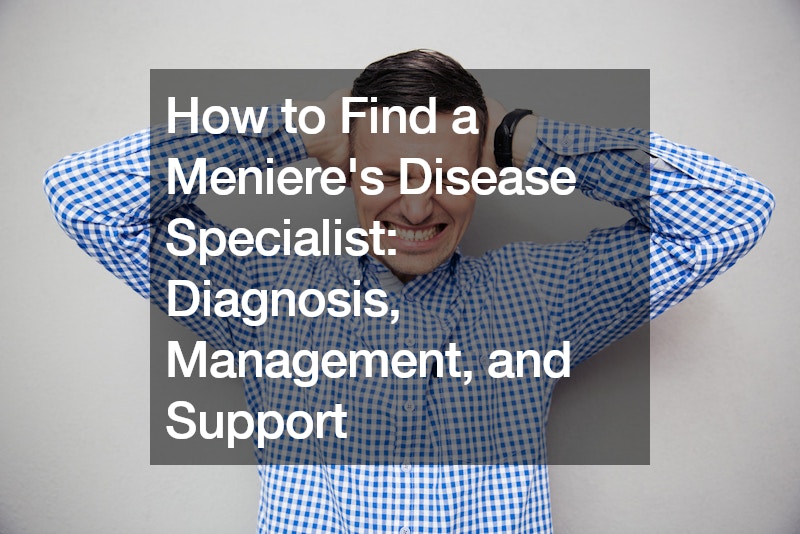
Meniere’s disease is a chronic inner ear disorder that can cause a debilitating combination of symptoms, including vertigo, tinnitus (ringing in the ears), hearing loss, and a feeling of fullness or pressure in the ear. If you suspect you have Meniere’s disease, finding the right menieres disease specialist is crucial for proper diagnosis, effective management, and ongoing support. This guide will equip you with the knowledge to navigate this journey.
Understanding Meniere’s Disease
Meniere’s disease affects the inner ear, the organ responsible for balance and hearing. The exact cause remains unknown, but it’s believed to be related to abnormal fluid buildup within the inner ear canals.
Symptoms typically occur in episodes and can vary in frequency and severity from person to person.
Common Symptoms of Meniere’s Disease:
Vertigo: A severe spinning sensation that can be disorienting and debilitating. Tinnitus: Ringing, buzzing, or other noises perceived in one or both ears. Hearing Loss: Fluctuating or progressive hearing loss, often affecting one ear initially. Aural fullness: A feeling of pressure or fullness in the affected ear. Nausea and vomiting: These can accompany vertigo attacks. The Importance of Early Diagnosis
Early diagnosis of Meniere’s disease is crucial. A prompt diagnosis allows for the implementation of treatment strategies to manage symptoms, minimize hearing loss, and improve quality of life.
Who Can Diagnose Meniere’s Disease?
Several types of specialists can diagnose and manage Meniere’s disease:
Otolaryngologists (ENTs): Ear, nose, and throat doctors are specialists in diagnosing and treating disorders of the ear, nose, and throat. They can perform hearing tests and other diagnostic procedures to rule out other conditions with similar symptoms. Neurologists: These specialists focus on the nervous system and can assess potential neurological causes of your symptoms. Neurotologists: These are subspecialized ENTs who have additional training and expertise in diagnosing and treating inner ear disorders like Meniere’s disease. Finding the Right Specialist
Here’s how to find a specialist qualified to diagnose and manage Meniere’s disease:
Start with your primary care physician. They can assess your symptoms, refer you to a specialist, and provide initial management recommendations. Ask for referrals: Talk to friends, family, or your dentist for recommendations on otolaryngologists or neurologists experienced in treating Meniere’s disease. Search online directories: Utilize online directories of healthcare providers maintained by professional organizations or medical institutions. Look for specialists with expertise in inner ear disorders. Consider academic medical centers: These centers often have specialists at the forefront of medical research and treatment for Meniere’s disease. Research your chosen specialist: Once you have a few options, research their qualifications, experience with Meniere’s disease, and patient reviews. What to Expect During Your Appointment
During your initial appointment with the specialist, be prepared to discuss:
Your medical history: This includes any past ear problems, surgeries, or head injuries. Your current symptoms: Describe your symptoms in detail, including the frequency, duration, and severity of each symptom. Family history: Mention any family members with hearing loss or inner ear disorders. The specialist might perform the following:
Physical examination: This includes examining your ears, nose, and throat. Hearing tests: These tests assess different aspects of your hearing, including pure tone audiometry and speech audiometry. Balance tests: These tests evaluate your sense of balance. Imaging tests: In some cases, imaging tests like CT scans or MRI scans might be ordered to rule out other conditions. Treatment Options for Meniere’s Disease
There is no cure for Meniere’s disease, but there are treatment strategies to manage symptoms and improve quality of life. These may include:
Lifestyle modifications: Reducing stress, managing salt intake, and avoiding caffeine and alcohol can help minimize symptom episodes. Medications: Diuretics can help reduce fluid buildup in the inner ear. Other medications might be prescribed to manage vertigo and nausea. Canalith repositioning maneuvers: These maneuvers can be helpful if misplaced inner ear canal stones cause vertigo. Injections: Injections of steroids or gentamicin into the middle ear can provide symptom relief. This is typically reserved for severe cases. Surgery: In very rare cases, surgery might be considered to destroy or deactivate the inner ear nerves responsible for balance (vestibular nerve section) or hearing (labyrinthine ablation). These are invasive procedures with potential side effects and should only be considered if other treatment options have failed. Living with Meniere’s Disease: Finding Support
Meniere’s disease can be a challenging condition to manage. Here are some resources and support systems that can help you cope:
Support groups: Connecting with others who understand your condition can be invaluable. Look for online or in-person Meniere’s disease support groups. Vestibular rehabilitation therapy: This type of therapy can help improve balance and reduce dizziness. Counseling: Coping with a chronic illness can be emotionally difficult. Consider seeking professional counseling to manage stress and improve emotional well-being. Staying informed: Educate yourself about Meniere’s disease and treatment options. Reliable sources of information include The American Academy of Otolaryngology-Head and Neck Surgery (https://www.entnet.org/), The American Speech-Language-Hearing Association (https://www.asha.org/), The Meniere’s Society (https://www.menieres.org.uk/) Remember: Meniere’s disease is a manageable condition. You can control your symptoms and live a fulfilling life with the right specialist, effective treatment strategies, and a strong support system.
Additional Tips
Advocate for yourself: Don’t hesitate to ask questions and express your concerns to your specialist. An active partnership with your doctor is crucial for successfully managing Meniere’s disease. Maintain a healthy lifestyle: Eating a balanced diet, exercising regularly, and getting enough sleep can contribute to overall well-being and potentially help manage Meniere’s disease symptoms. Manage stress: Stress can worsen Meniere’s disease symptoms. To manage stress effectively, practice relaxation techniques like yoga, meditation, or deep breathing. By following these tips and taking an active role in your healthcare, you can navigate your journey with Meniere’s disease with knowledge, confidence, and a focus on living well.
.




